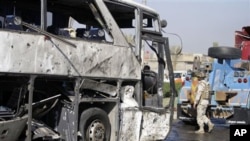Iraqi authorities say more than a dozen people were killed and more than 80 injured in a series of bombings Saturday in the Iraqi capital Baghdad. Most of the victims were Shi'ite, including a large number of Iranian pilgrims.
The series of explosions was apparently aimed at areas with a heavy Shi'ite presence. To emphasize that point, the perpetrators also attacked several groups of shi'ite Iranian pilgrims.
The bombings came after Iraqi officials announced Thursday that they had arrested 39 alleged al-Qaida militants. Al-Qaida has been targeting Iraqi Shi'ites and religious minorities.
Baghdad security official General Qassem Mohammed Atta immediately pointed the finger at al-Qaida, claiming that it was behind the bombings. "The targeting of Shi'ite areas," he told Reuters, "is an attempt to… inflame sectarian conflict."
Iraqi government TV showed images of a commercial district in the Shi'ite neighborhood of Baiyaa in which a number of people were killed or wounded. Concrete walls appeared to have toppled into the street, chunks of debris littered the ground, and burned-out vehicles lined the roadside.
A middle-aged man who lives in the neighborhood complained that the victims were all civilians. He says that his neighborhood is just a civilian area with people going about their business, so there is no reason for the attack. He says residents are nonviolent and don't get involved in politics. The explosion, he adds, hit services and homes, blowing out windows and metal girders.
Several blasts also targeted tour groups of Iranian piligrims outside the revered Shi'ite Moussa al-Kadhim mosque. A guest house for Iranian pilgrims was hit, as well. Eyewitnesses spoke of dozens of casualties.
Al-Sharqiya TV reported that an Iranian revolutionary guard officer was killed by assailants as he drove to his office. The TV also showed images of his bullet ridden vehicle.
The explosions appeared to be intended to embarrass the caretaker government of Prime Minister Nouri al-Maliki as he struggles to form a new Cabinet. Mr. Maliki was formally chosen by President Jalal Talabani to form the next government on November 25.
Iraqi satellite channels spoke of at least six separate explosions or attacks Saturday, at the same time the Iraqi army and security forces carried out drills to prove their readiness for the expected withdrawal of residual U.S. forces at the end of next year.
Saturday's explosions also came during a visit by German Foreign Minister Guido Westerwelle, who met with top Iraqi leaders in the Green Zone. Iraqi Foreign Minister Hoshyar Mahmud Zebari asserted that the visit was a sign of confidence as Iraq prepares to name a new government:
He says the visit is important because it is the first by a foreign official to Baghdad now that the government is about to be formed after the recent political agreement between Iraqi leaders.
Acts of violence and overall casualties have dropped since the height of communal strife several years ago, but numerous explosions and assassinations take place regularly.
Dozens of Casualties in Explosions Targeting Shi'ite Areas of Baghdad




